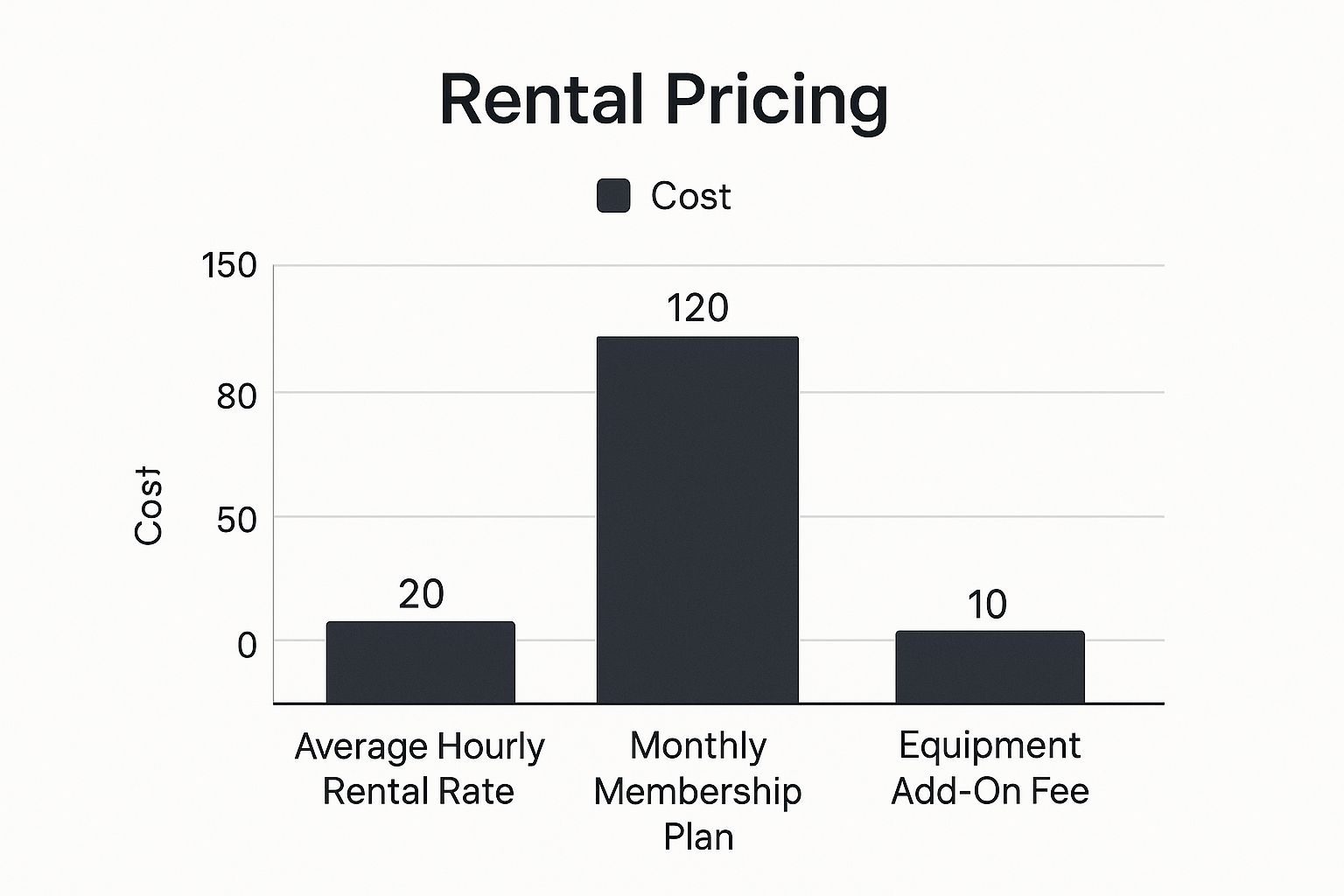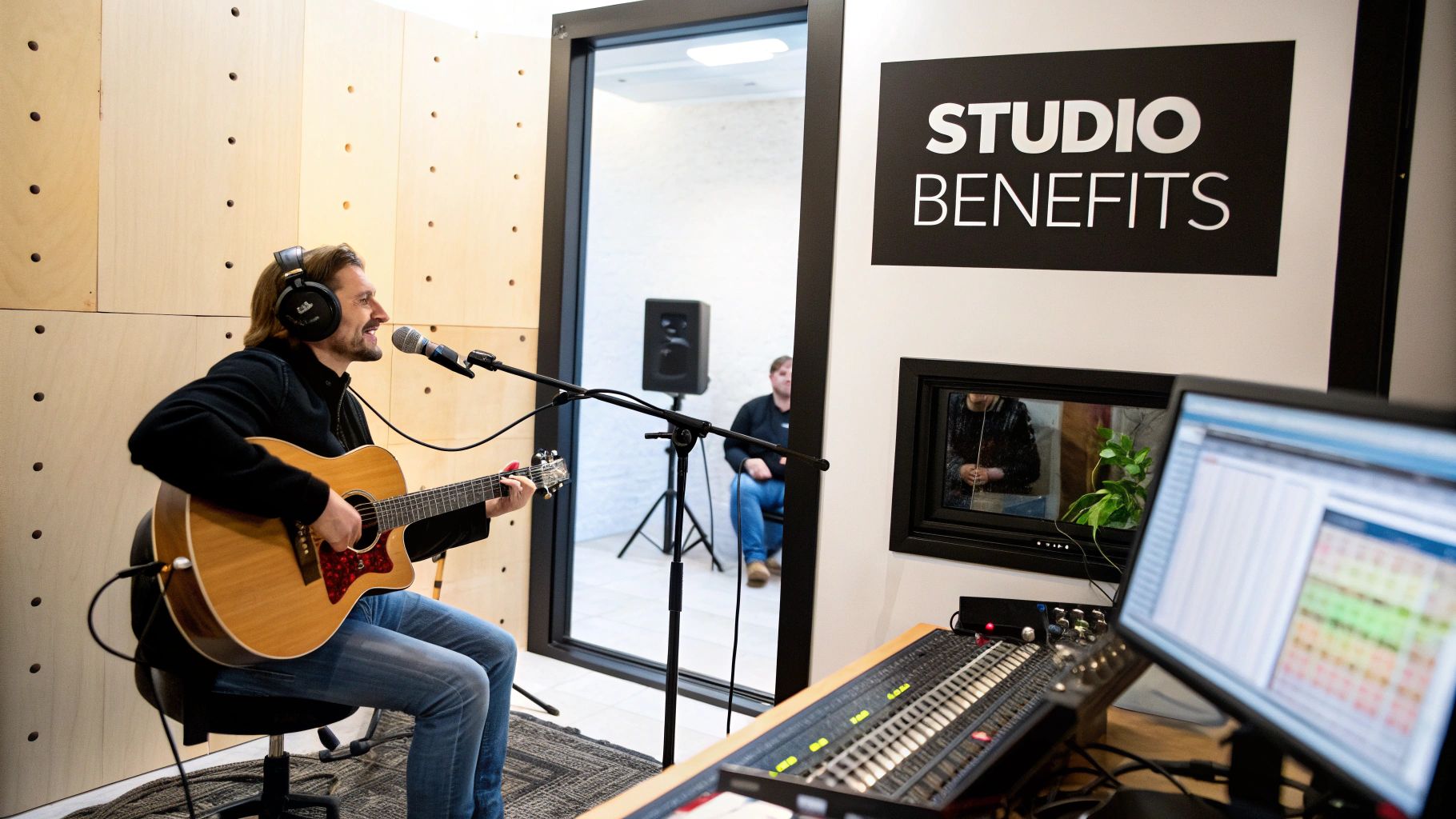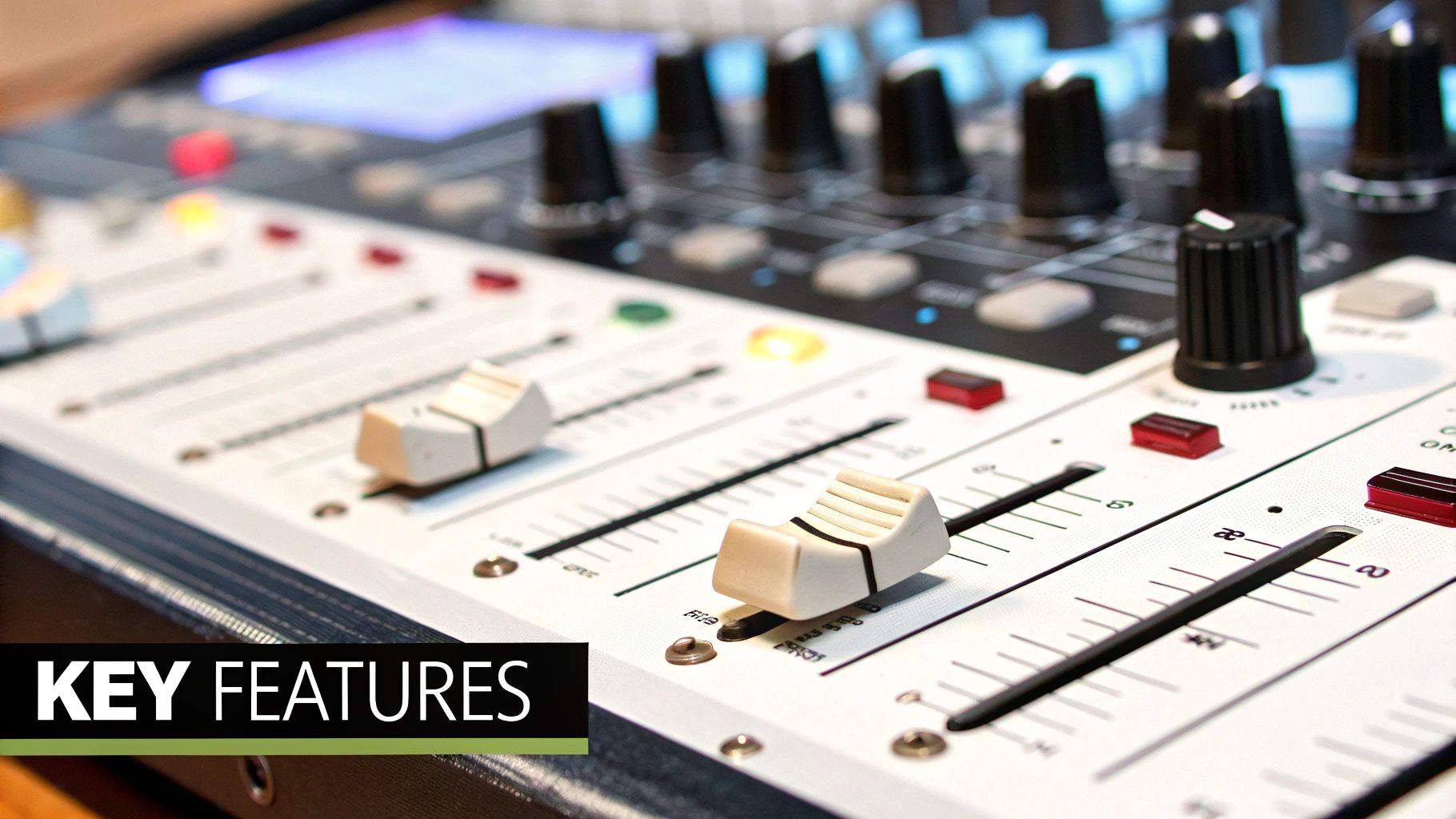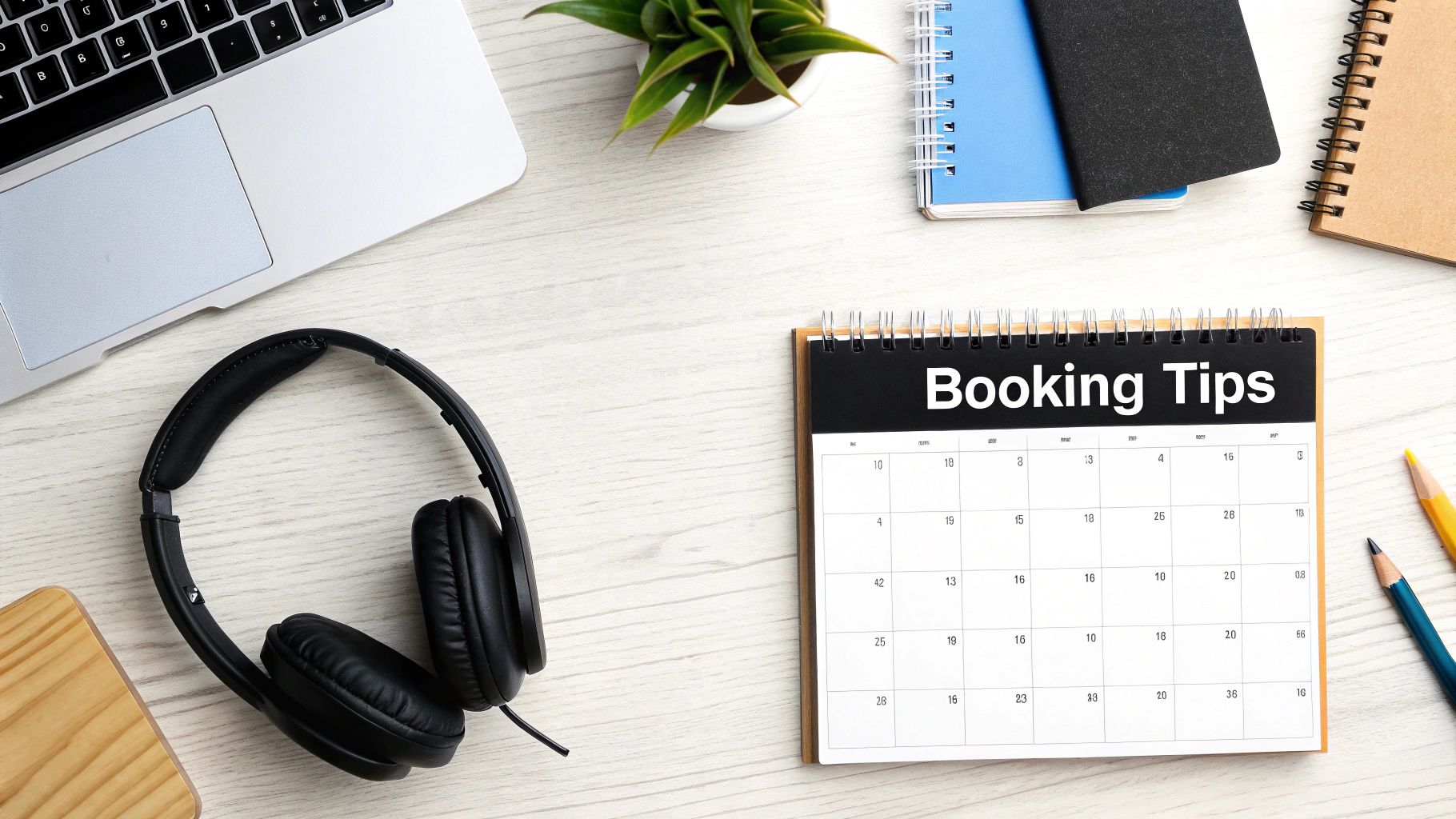A Guide to Music Studio Rent in Australia
- contact733797
- Sep 10, 2025
- 11 min read
So, you're looking for a music studio to rent, and the big question on your mind is: how much is this going to cost? It’s often the first thing artists ask, and for good reason. In Australia, the prices can swing quite a bit, but once you get a handle on what drives the costs, you can find a space that works for your sound and your wallet.
Decoding Music Studio Rental Costs in Australia
Booking professional studio time is a serious investment in your music. The final price you'll pay is a cocktail of different ingredients – everything from the studio's postcode and its reputation to the gear in the rack and the experience of the person behind the desk.
Think about it this way: a basic rehearsal room is perfect for jamming and tightening up your live set, and it'll likely only cost you a modest hourly fee. On the other hand, if you’re walking into a high-end recording facility with a legendary mixing console, a closet full of boutique microphones, and acoustically perfect rooms, you can expect a higher price tag. It's all about finding the right fit for your project's goals.
Key Factors Influencing Price
A few key things will dictate the final number on the invoice. Keep these in mind as you start shopping around:
Location, Location, Location: It’s no surprise that studios in the CBD of cities like Sydney or Melbourne have higher rents and running costs. This overhead usually gets passed on to the artist, so you'll often pay more for a prime location.
The Quality of the Gear: If you want to record through industry-standard equipment like Neumann microphones or an SSL console, that access comes at a premium. The better the gear, the more you can generally expect to pay.
An Engineer on Deck: A "wet hire" (which includes an in-house engineer) will naturally cost more than a "dry hire" (just the room and equipment). But don't discount the value an experienced engineer brings—their skills can save you a ton of time and dramatically elevate the quality of your final track.
For a deeper dive into the studio scene in one of Australia's creative hotspots, check out our guide to music studio hire in Melbourne.

As you can see, hourly rates are the standard, but it's worth asking about package deals or memberships if you plan on being a regular. These can often provide much better long-term value.
To give you a clearer picture, here’s a breakdown of what you might expect to pay for different types of studios across Australia.
Typical Music Studio Rental Rates in Australia
This table gives you a rough idea of the hourly rates for different studio setups, helping you budget for what your project actually needs.
Studio Type | Typical Hourly Rate (AUD) | Best For |
|---|---|---|
Rehearsal Space | $25 - $50 | Bands practicing their live set, songwriting sessions. |
Home/Project Studio | $40 - $80 | Solo artists, vocal tracking, simple overdubs, podcasting. |
Professional Studio (Dry Hire) | $60 - $120 | Experienced producers, mixing sessions, tracking with your own engineer. |
Professional Studio (Wet Hire) | $80 - $180+ | Full band recording, vocal production, artists wanting professional guidance. |
These are just estimates, of course, and prices will always vary based on the specific studio. But it’s a solid starting point for figuring out what's realistic for your budget.
On average, you can expect to pay anywhere from $60 to $180 per hour for a professional music recording studio in Australia. In a competitive market like Sydney, the hourly rate often hovers around the $100 mark, but you can find options as low as $46 or well over $150 for premium facilities.
Finding the Right Studio for Your Sound

Choosing where to rent a music studio isn't a simple case of finding the closest or cheapest option. The space has to fit the project. After all, a solo artist laying down a vocal demo has completely different needs to a five-piece band trying to capture the energy of their live set.
Before you even begin your search, you need to get crystal clear on your project's essentials. Are you just tracking a single acoustic guitar, or do you need a live room big enough for a full drum kit and a couple of cranked amps? Figuring this out first is the secret to finding a great studio without paying for gear and space you’ll never touch.
Nailing Down Your Project's Needs
A little prep work here saves a lot of headaches later. Start by asking yourself a few straightforward questions to really sharpen your focus.
What are you actually making? A podcast episode has different technical demands than a voice-over, a quick musical demo, or a single destined for commercial release. You don't need a world-class mixing desk to record a great podcast.
Who needs to be there? Get a headcount. A solo producer can comfortably work out of a compact production suite, but a full band will need a proper tracking room, maybe even with a few isolation booths.
Is there any must-have gear? Be specific. Do you need a particular vintage microphone for your vocals, access to a real grand piano, or a certain preamp to dial in that signature guitar tone?
Answering these questions first helps you build a realistic shortlist of studios that can actually deliver what you need.
The Australian music scene is buzzing with creators, from solo artists to voice-over professionals, and studios are set up to meet that demand. In a city like Sydney, for instance, you'll find a massive range of top-tier facilities offering everything from quick hourly bookings to full-day lockouts. It’s worth exploring Sydney's recording studio options to get a feel for what’s out there.
Sizing Up the Gear and the Room
With your project's blueprint in hand, you can start digging into what different studios have on offer. It's easy to get impressed by a long list of expensive brand names, but don't stop there. The room itself—its size, layout, and acoustic treatment—is often more important than any single piece of gear.
The acoustics are half the battle. A room with great sound treatment will give you clean, professional-sounding recordings, which can save you an enormous amount of time and stress when it comes to mixing.
Think about the practical flow of your session. A band tracking live, for example, needs good sightlines between musicians and probably a couple of iso booths to stop the drums from bleeding into every other microphone. A podcaster, on the other hand, just needs a quiet, comfortable space with a simple, high-quality vocal chain.
The real trick to a smooth, productive session is matching the facility to the function.
How to Squeeze Every Last Drop Out of Your Studio Time

So, you’ve booked the studio. Congratulations! Now for the hard part: making sure you don't waste a cent. The moment you walk through that door, the clock is ticking, and time really is money.
The difference between a frustrating, expensive session and a deeply productive one comes down to one thing: preparation.
This means doing your homework long before you load in your gear. Finalise your song arrangements. Nail those tricky passages. Make sure every single musician knows their parts backwards and forwards. A recording studio isn't the place for a glorified band practice; it's where you capture a performance that's already polished. A well-rehearsed band can get tracks down quickly, which frees up precious time for the fun stuff—experimenting with sounds and getting creative with overdubs.
Have a Game Plan Before You Arrive
Walking into a session without a clear, written plan is a rookie mistake. I'm not just talking about a list of songs; you need a realistic roadmap for your time.
Set Crystal-Clear Goals: What’s the number one thing you must walk away with? Is it getting solid drum tracks for three songs? Or is it finishing every vocal for one killer single? Be specific and realistic.
Build a Timeline: Roughly map out your day. Allocate time for setting up, getting sounds, tracking each instrument, and, importantly, taking breaks. A schedule keeps things from getting bogged down and helps you stay on track.
Bring Reference Tracks: Have a few songs on your phone that have the kind of sonic vibe you're chasing. Playing these for the engineer is the fastest way to communicate the sound you have in your head.
The most valuable asset you have in the studio is clarity. When you know exactly what you want to achieve and can communicate that to your engineer, you cut out hours of guesswork. It’s the surest way to get a final mix that matches your original vision.
Dial In Your Workflow and Communication
Efficiency in the studio is all about having a smooth workflow. You can minimise downtime by simply being organised. Think ahead and pack everything you might need: spare guitar strings, a drum key, chargers for your devices, and printed lyric sheets. These small things prevent those momentum-killing pauses that can derail a session.
Beyond that, focus on building a good rapport with the studio engineer. They're your most important collaborator for the day. Be clear about your creative ideas, but also trust their expertise and be open to suggestions. A huge part of what you’re paying for is their technical skill.
For more on this, you can learn how to make the most of your recording studio hire in our dedicated guide. An experienced engineer can find the perfect mic placement or dial in a specific tone way faster than you could on your own, turning a good take into a truly great one.
How to Make the Most of Your DIY Studio Experience
When you book a modern creative space, you're often getting more than just four walls and a gear list. The real value can lie in the support systems that top-tier facilities have built around their spaces. Think of it less as a simple music studio rent and more as stepping into a production partnership that empowers you to create—whether you’re a seasoned pro or just starting out.
These spaces are often designed to be plug-and-play, but the best ones offer support behind the scenes. This concierge service for creators can be a game-changer. Need a crew? They can handle it, linking you with the right people and tools to bring your vision to life. From photographers to editors, lighting setups to sound checks, this ecosystem removes creative friction so you can focus on your art.
Using a Cyclorama Studio?
This is where on-site support truly shines. You can bring your own camera and crew, or ask the studio to connect you with a trusted photographer or videographer from their network. If you’re new to lighting or unsure how to get started, the studio team can guide you through what you need or step in with setup support. The goal is to make it easy for you to walk in and create confidently.
What About Podcast Studio Access?
For podcast users, many modern studios offer a fully-equipped, ever-evolving set, often with a dedicated production manager on-site. Whether you’re filming an interview, a solo series, or a branded piece of content, they can help set the vibe and adjust the layout to suit your vision. With flexible sets, high-quality gear, and expert support on hand, you have everything you need.
The real benefit of these support services is that they turn a simple rental into a collaborative experience. When you don't have to worry about finding crew or solving technical problems, you can pour all that mental energy into what actually matters—your performance.
Navigating The Booking Process And Common Pitfalls
You’d think booking a music studio would be straightforward, but a few common slip-ups can easily lead to headaches and unexpected costs. The secret to a smooth experience? It all comes down to reading the fine print and planning ahead. This way, there are no nasty surprises when you rock up for your session.

Before you hit that ‘confirm’ button, make sure you properly dive into the studio’s terms and conditions. This is where you’ll find all the crucial details that protect both you and the studio owner.
Pay special attention to the cancellation policy. Some studios need 48 hours’ notice for a refund, while others might not offer one at all. It’s also smart to check their rules on bringing in your own gear and what the rates are if you run over your allotted time.
Plan Ahead To Avoid Disappointment
In competitive creative hubs like Melbourne and Sydney, locking in your studio time well in advance is a must. Procrastination is the enemy here, as the best slots—especially evenings and weekends—get snapped up weeks, sometimes months, ahead of time. A little bit of planning means you get the time you actually want without having to settle.
The demand for these creative spaces isn't happening in a vacuum; it’s tied to the broader rental market. In fact, as commercial vacancy rates in major Aussie cities dropped between 2020 and 2023, the competition for all kinds of spaces, including studios, has heated up. With advertising rents climbing by about 5 percent year-on-year by early 2023, booking early is more critical than ever. For a deeper dive, check out the Australian rental market trends from the ABS.
A classic mistake is just assuming the studio will have a spot free at the last minute. Treat booking your music studio like you would a flight—the earlier you lock it in, the better your options (and peace of mind) will be.
Finally, think beyond the recording session itself. What happens after you’ve laid down your tracks? Podcasters, for example, often need a quick turnaround on editing. Knowing what post-production support is on offer can be a real game-changer.
If you're getting into podcasting, we have some specific advice on finding the best podcast studios in Melbourne that can help you figure out what to look for. By getting these details sorted upfront, you can walk into your session confident and ready to create.
Got Questions About Renting a Music Studio? We've Got Answers
Stepping into the world of studio rentals for the first time can feel a bit daunting. There's a lot of new lingo and processes to get your head around. To clear things up and help you walk into your session with confidence, here are some of the most common questions we get from Aussie artists.
What's the Difference Between Dry Hire and Wet Hire?
This is probably the first and most important thing you need to get straight when you start looking at studios.
Dry Hire: Think of this as renting the room and the gear, and that's it. It’s perfect if you’re an experienced engineer yourself or you're bringing in your own trusted producer. You're in complete control.
Wet Hire: This is the all-inclusive option. When you book a wet hire session, you get the studio plus the expertise of an in-house sound engineer or producer. They'll handle all the technical stuff—from setting up the mics to running the recording software—so you can just focus on nailing your performance.
What Should I Bring to My First Recording Session?
Nothing kills the creative vibe faster than having to stop because you forgot something simple. A little bit of prep goes a long way. Obviously, you'll bring your instruments, but there are a few other essentials you should always have in your bag.
Pack spares of everything that can break: guitar strings, picks, and drumsticks are a must. Also, bring any specific pedals, amps, or bits of kit that are absolutely essential to your sound. Don't forget to have your lyric sheets, chord charts, and a rough plan for the session handy. It's also a great idea to have a few reference tracks on your phone to help show the engineer the exact vibe you're chasing.
And it’s not just for musicians anymore. If you're a podcaster, for example, many modern studios offer fully-equipped sets with a production manager on-site to help. They can tweak the layout and lighting to perfectly match the mood of your interview or solo show, since most of the gear is top-notch and the set is designed to be flexible.
Can I Bring My Own Engineer to a Studio?
Most of the time, absolutely. Studios are generally pretty flexible about this, especially when you're doing a dry hire and just paying for the space.
That said, it's always best to check with the studio manager when you book. Some places might want your engineer to have a quick rundown of their specific mixing desk or setup. It’s just a precaution to make sure the session runs smoothly and none of their expensive gear gets damaged.
A quick email or phone call to the studio ahead of time can clear up any confusion. It’s always better to ask first than to make assumptions.
How Far in Advance Should I Book a Studio?
In major creative hubs like Sydney or Melbourne, you'll want to book at least two to four weeks ahead, particularly if you’re after a weekend or evening slot. Those prime times get snapped up fast.
If you’re tackling a bigger project, like an EP or a full album, you should be thinking several months in advance. This gives you the best chance of locking in a block of consecutive days, which is crucial for keeping the creative momentum and sonic consistency going across all your tracks.
At That Creative Hub, we provide the professional spaces and support you need to bring your vision to life, whether it's music, a podcast, or a photoshoot. Explore our studios and book your next session today.
We greatly value the clarity and depth of this message. Their research may provide valuable new insights into the development of online entertainment platforms. For additional in-depth research, see the website for more details. The article's objective stance makes it a reliable information source.